We acknowledge that the final authority regarding these messages
rests
with the Holy See of Rome.

| Mary has requested that the daily message be given each day to the
world. It is read nightly at the prayer service from her Image Building in Clearwater,
Florida, U.S.A. This is according to her request. All attempts will be made to publish
this daily message to the world at 11 p.m. Eastern time, U.S.A. We acknowledge that the final authority regarding these messages
rests |
 |
February 11th Holy Spirit Novena
Scripture selection is Day 8 Period I.The Novena Rosary Mystery
for February 11th is Glorious.
We need a lot of money to get
a picture machine that can do
wallet pictures, and so we can send
pictures to the priests.
February 10, 2003
Messenger:
Jesus wants us to have a picture machine.
Jesus wants this picture to go to the
priests immediately.
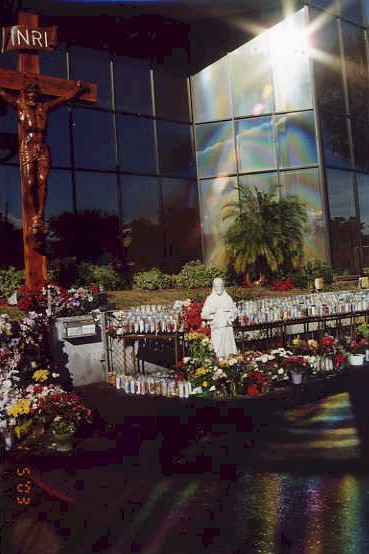
January 5, 2003
Jesus wants us to send a wallet picture
of Father Carter.
Jesus wants us to send the Prayer Manual
and the Spirituality Handbook.
Jesus said this is very urgent.
Jesus said priests beginning these prayer
chapters will help bring peace to the
world.
Jesus is telling us to pray these prayers
for the priests, the Church, and the world.
He has told us now for 9 years.
Will you please help us with funding
and purchasing this picture machine?
Mary and Jesus appear.
These pictures were taken today
at the beginning of the 6:20 prayers.

February 10, 2003
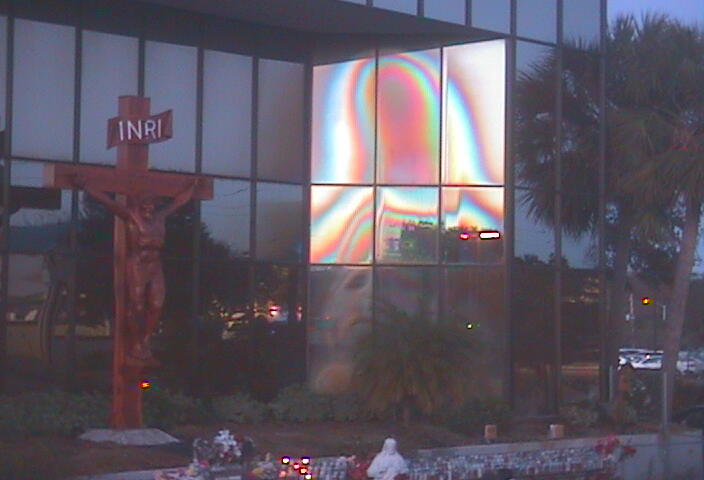
February 10, 2003

February 10, 2003
With the state the country is in,
why are you
ignoring this
sign?
Mary and Jesus have asked us to circulate
these images.
Jesus speaks:
I have requested this mailing to be
sent to the priests.
It is urgent for your world
that you pray now as I have
directed.
Here is the message I gave to
Father Carter.
~ July 31, 1994 ~
Words of Jesus to Members of
Shepherds of Christ Associates:"My beloved priest-companion, I intend to use the priestly newsletter, Shepherds of Christ, and the movement, Shepherds of Christ Associates, in a powerful way for the renewal of My Church and the world.
"I will use the newsletter and the chapters of Shepherds of Christ Associates as a powerful instrument for spreading devotion to My Heart and My Mother's Heart.
"I am calling many to become members of Shepherds of Christ Associates. To all of them I will give great blessings. I will use them as instruments to help bring about the triumph of the Immaculate Heart and the reign of My Sacred Heart. I will give great graces to the members of Shepherds of Christ Associates. I will call them to be deeply united to My Heart and to Mary's Heart as I lead them ever closer to My Father in the Holy Spirit."
- Message from Jesus to Father Edward J. Carter, S.J., Founder, as given on July 31, 1994,
feast of Saint Ignatius Loyola, Founder of the Society of Jesus (The Jesuits)end of July 31, 1994 message given to Fr. Carter
Jesus speaks:
I wish this spiritual bouquet
of Masses for My priests be
sent out immediately as thus:
The picture must be a real
photo.
Situated on the card as thus:
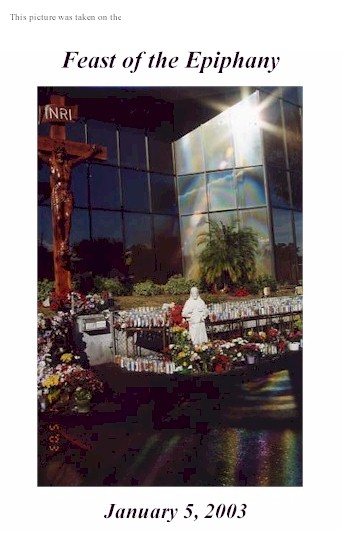
Jesus speaks:
I only wish this mailing to be sent
out under the authority of the
president and members of
Shepherds of Christ.
I further ask this message be
included.

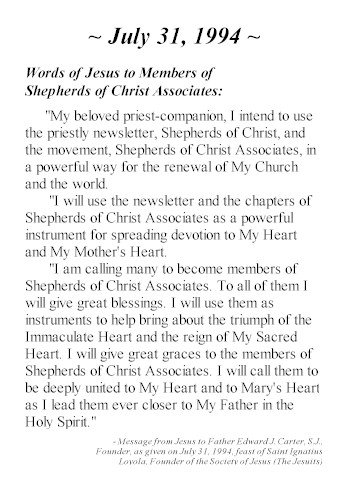
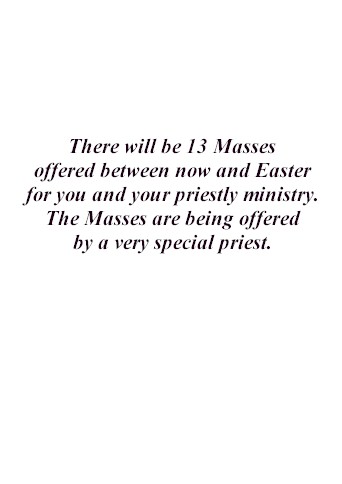
Jesus speaks:
I am Jesus, the Son of God.
I have given you My Movement
to pray for My world.
You have ignored Me.
I request that you help with
funding of this picture machine
and this mailing.
It is urgent to the peace of the
world that you heed My
requests as I have asked.
Do you want peace?
|
I have given you these prayers to pray at 6:20 and 6:30 for the peace of the world. |

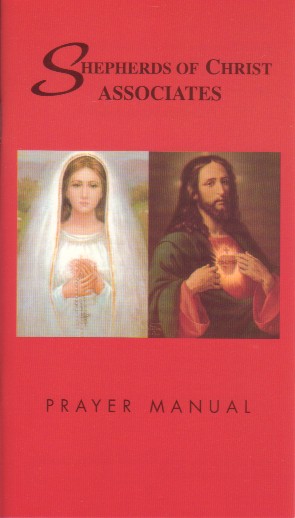 |
Here are the pictures taken
today during these 6:20 prayers.

February 10, 2003

February 10, 2003

February 10, 2003
Jesus speaks:
This is a sign I give to you this day.
Tomorrow is the feast of "Our
Lady of Lourdes".
Mary appeared to My messenger
on many 5ths in this grotto
at Holy-Cross Immaculata Church
October 5, 1994 until Jesus
appeared December 5, 1996.


Jesus speaks:
Please, it is urgent that you
purchase this picture machine
to make available to the world
these pictures.
To the person who gazes on these
images, I will outpour special
graces for peace and healing.

January 5, 2003
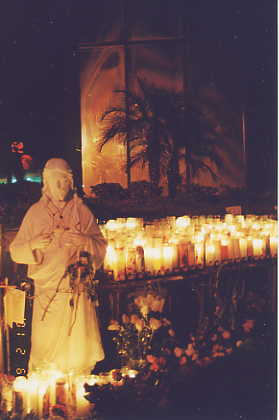
February 5, 2001
This is My sign given to you.
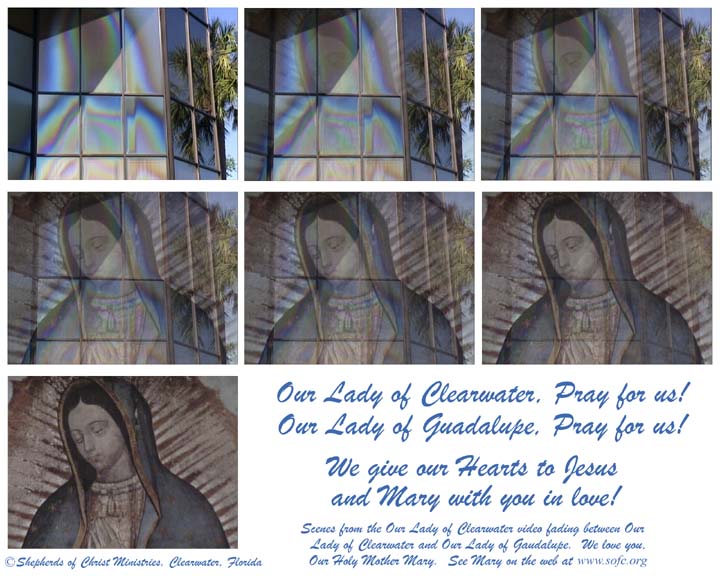
Jesus speaks:
This message was given two days
after Mary appeared on the
building in Clearwater.
December 19, 1996
Mary: My dear children, I give to you, my Son, Jesus, born in a stable in Bethlehem on Christmas morn. He is the Almighty God, the Light of the World.
I appear to you, my children, on a (former) bank in Florida. You have made money your god! Do you know how cold are your hearts? You turn away from my Son, Jesus, for your money. Your money is your god.
I am Mary, your Mother. I do not appear as I once appeared to you. I am asking you today to circulate my message given on a tape on the feast of Our Lady of Guadalupe, December 12, 1996. Please circulate this tape now. Give it to as many people as you can. I am Mary, your Mother. Please circulate my Rosary Book.
end of December 19, 1996 message
Jesus speaks:
Show everyone pictures
of this image.
This is why it has been
given to you.
Prayer chapters are to be
started as I have requested
praying the rosary with the
prayers.

Will you please help Me?
Call Morrow, Ohio.
I love you.
I desire My Sacred Heart
to Reign in all hearts
on this earth.
I desire My Sacred Heart
to Reign in all places.

China, Indiana
February 13, 2003
There will be a special prayer service
at 12:00 p.m. on the 13th.
Eucharistic adoration: February 12th-14th
ending with Mass on the 14th at 12 noon
There will be a Blue Book reading
on Sunday at 4:30 pm
after the Mass audio.
Response to God's Love reading
will be on Tuesday February 11, 2003
after the 6:20 prayers
and will be on the internet
tomorrow.
February 10, 2003
Messenger: Children
come into the world as babies.
They don't know how to do many things.
They must learn.
We can see how a baby must learn physical
things.
We can see how a baby has to learn to
interact.
Some people have been hurt by parents
and other children.
Some children are given such love
while others suffer from
parents, caretakers and others.
We come into this earth a baby.
We have a life-time to learn to love.
Marriage is a gift from God.
People in intimate relationships
help each other grow in
greater perfection.
If they truly love God and love one
another they can learn
to grow in greater oneness.
Our life is spent in setting boundaries
with each other, in learning to
interact.
One person can be in charge of a business
and be very argumentative,
they argue just to be on top.
On some talk shows people argue
just to be "smarter" than everyone
else.
Some people like to get the floor by telling
something that nobody has ever heard.
Some people argue about basic truths
just to be above others.
I see some teachers who teach children
about the Bible and try to
"down-play" the importance of the
Bible to make themselves above
the Bible.
The bottom line is what is the truth.
Some people get to the point that all they
do is criticize and see themselves
as being above everybody else.
We are all imperfect.
We have all learned to do some sort of
dance when interacting with others
in personal relationships —
A person wounded by others in
intimate relationships may try to
work out their unfinished problems
in previous relationships with the
new partners.
They may identify problems with
a dad or ex-male friend with
all men or problems with
moms or an ex-female friend
will all women.
It is necessary to look at ourselves.
If a person does not look at themselves
and always wants to be on the top
of the ladder - "no matter what" —
they will work for this in everything
they do.
They see themselves above everybody else —
being more intelligent than everyone
else.
Some people see themselves as victims.
February 10, 2003
Messenger:
Some people see themselves as victims
then wherever they are they see those
around them as victimizing them.
It is difficult at work and home
and in Church work if people
are always working out their
"baggage" on others.
In our attempt to unite and have
oneness, the differences we have
may be road blocks to accomplishing
work if parties are not willing
to work through things
God is calling us to.
We see how many divorces there are.
Fr. Carter said this about divorce
in his book Response to God's Love
Chapter 8.
"Many persons who choose marriage say they do so out of a desire to be loved. Notice, they say that they marry out of a desire to be loved, not to love. In fairness to these persons, perhaps we should presume that they realize they in turn must also offer love. Yet, is it not revealing that they explicitly mention as the reason for marrying a desire to be loved? Could there be a close correlation between this phenomenon and the extraordinarily high divorce rate that prevails in our culture? If it is common that both partners enter marriage more from a need to receive love than from a desire to give it, do we have to look further for the reason to explain why so many marriages are plagued with various degrees of unhappiness?"
(Response to God's Love, page 93)
Messenger:
Jesus is the one who can fill our
needs for love. We cannot ever
expect another to make us
happy. The more we look for
this, in a person, the more
we are disappointed because
people are imperfect.
The Shepherds of Christ Radio is important
to keep us focused on God and why we
are here. We are to live here and grow
to be more like Jesus.
Some people will never look at
themselves.
Some refuse to go back and
look at hidden wounds. They
can be so wounded inside
from other relationships and
hurt others in relationships
today because they project their
problems on new partners —
seeing themselves as victims.
If all were truly trying to grow in
holiness, praying all through the
day for this — to be more perfected
in their ways of loving like Jesus —
more would be loving in harmony.
Some people get control by passive-
aggressive measures — they are
not in control — they draw
everything out to get the floor acting
like they don't understand, etc. —
trying to frustrate the one in charge
trying to accomplish a task.
Some people want to be rescuers. They
want someone always under them
and needing them.
Some work against the grain
making everything very complicated
to get control and have their way.
To ask them to do anything may be the
beginning of a whole process where
they siege the opportunity for
emotional control. In religious orders,
some underneath can try to
manipulate those in authority
in all sorts of ways.
The basic attitude must be operating
in oneness for the glory and honor
of God promoting God's
Kingdom.
People that never had their
needs met in loving relationships
as a child may spend their whole
life trying to get their unmet needs
met from their partners in intimate
relationships.
Some people truly marry to "get love"
as Fr. Carter noted in his book
not to give love.
A person in charge in a business
with an addiction can make
everyone in the business suffer
while they go through the
withdrawal processes and feeding
their addictions. They may
always be in some dysfunctional
stage, working with a hangover,
anticipating the fix of whatever
it is, then responding when
they do take the drug, alcohol
or whatever, being happy, content etc.
Some can be addicted to power,
control, sex, they center
their life on this.
Some have so much
pain inside they numb it
with certain means
rather than deal with it.
Like a crying baby they need the
fix, they go through moods.
They depend on something they
need outside of themselves.
A person in authority should do God's
will and not do things for their
own desire for control, recognition
or power.
The central thought we should have is to
be like Jesus, act as He wants
us to do to promote His Kingdom.
Can you imagine if everyone made
Jesus the King and Center of their
hearts and focused on their life here,
as a means to the end, that being
eternal life, to be with God in heaven
for all eternity.
Adam and Eve sinned.
Jesus is the New Adam.
Mary the New Eve.
Two people get married and they can
act out the dance they are used
to in their previous homes.
We all grow up in homes and interact
intimately with others.
When two marry they take lots of
interaction patterns with them from
the past and attempt to live together.
Some may think its good to expose
children to the "world"
and do what they want while
they let their children be
taught poison from the world.
Others may try to shelter their
children from the world to
an extreme.
The bottom line is we live in the
world, we are members of the
human race, if one person
is doing things not according
to God's will it affects
everybody else.
If a person is loving and a
light to the world it affects
everybody else.
Two men looked out of prison bars
one saw mud, the other stars.
Think of two men running a business —
the one in charge is argumentative —
his power is most important to him —
he doesn't trust anyone — he criticizes
everybody in the business and the world
to make himself higher than them
he thinks. He says to himself — look
at how messed up they are, judging
everyone as inferior to him,
criticizing country, church,
schools and seeing himself
as the measuring stick — what
he does he thinks is perfect —
he is "smarter" than every one else.
His wife tries to control everybody
to fit her needs, she is
always "smarter" then everyone —
she thought it first —
When you are with them, you
are worn out, they argue about
good things and make them bad,
they criticize people and see
all people as messed up —
who is in, people like them —
but a person could never measure
up to them because they are always
going to point a finger criticizing —
trying to catch the person in their snare —
what is most important to them is they are above
everybody — they are perfect
and they
get their feeling of superiority by
criticizing and looking down on
everyone else.
Another man and woman are
married, mild, harmonious,
loving and are forced to put
up with those in charge.
Children that are very young can be
forced in day-care with other children
that are angry and always fighting
because they are unhappy
inside, acting out disharmony
in their home life.
Jesus comes with a kind and generous Heart.
Jesus is the New Adam.
Mary is the New Eve.
Mary tells us at Fatima we must
consecrate our hearts to the
New Adam and the New Eve, the
Sacred Heart of Jesus and Immaculate
Heart of Mary.
I write as a messenger of God.
I write to a world that is wounded —
We cannot isolate our children —
people are in authority that are
hurting others
much of the world does not respect
authority
ADAM AND EVE
Listen to the Fall of Adam and Eve in
the beginning of the Bible
Genesis Chapter 3
The Fall
Now, the snake was the most subtle of all the wild animals that Yahweh God had made. It asked the woman, ‘Did God really say you were not to eat from any of the trees in the garden?’ The woman answered the snake, ‘We may eat the fruit of the trees in the garden. But of the fruit of the tree in the middle of the garden God said, "You must not eat it, nor touch it, under pain of death." ’ Then the snake said to the woman, ‘No! You will not die! God knows in fact that the day you eat it your eyes will be opened and you will be like gods, knowing good from evil.’ The woman saw that the tree was good to eat and pleasing to the eye, and that it was enticing for the wisdom that it could give. So she took some of its fruit and ate it. She also gave some to her husband who was with her, and he ate it. Then the eyes of both of them were opened and they realised that they were naked. So they sewed fig–leaves together to make themselves loin–cloths.
The man and his wife heard the sound of Yahweh God walking in the garden in the cool of the day, and they hid from Yahweh God among the trees of the garden. But Yahweh God called to the man. ‘Where are you?’ he asked. ‘I heard the sound of you in the garden,’ he replied. ‘I was afraid because I was naked, so I hid.’ ‘Who told you that you were naked?’ he asked. ‘Have you been eating from the tree I forbade you to eat?’ The man replied, ‘It was the woman you put with me; she gave me some fruit from the tree, and I ate it.’ Then Yahweh God said to the woman, ‘Why did you do that?’ The woman replied, ‘The snake tempted me and I ate.’
Then Yahweh God said to the snake, ‘Because you have done this,
Accursed be you of
all animals wild and tame!
On your belly you will go
and on dust you will feed
as long as you live.
I shall put enmity
between you and the woman,
and between your offspring and hers;
it will bruise your head
and you will strike its heel.’To the woman he said:
I shall give you intense pain
in childbearing,
you will give birth to your children
in pain.
Your yearning will be for your husband,
and he will dominate you.To the man he said, ‘Because you listened to the voice of your wife and ate from the tree of which I had forbidden you to eat,
Accursed be the soil because of you!
Painfully will you get your food from it
as long as you live.
It will yield you brambles and thistles,
as you eat the produce of the land.
By the sweat of your face
will you earn your food,
until you return to the ground,
as you were taken from it.
For dust you are
and to dust you shall return.’The man named his wife ‘Eve’ because she was the mother of all those who live. Yahweh God made tunics of skins for the man and his wife and clothed them. Then Yahweh God said, ‘Now that the man has become like one of us in knowing good from evil, he must not be allowed to reach out his hand and pick from the tree of life too, and eat and live for ever!’ So Yahweh God expelled him from the garden of Eden, to till the soil from which he had been taken. He banished the man, and in front of the garden of Eden he posted the great winged creatures and the fiery flashing sword, to guard the way to the tree of life.
Messenger:
Listen to Revelation 12: 1-2
Revelation 12: 1-2
Now a great sign appeared in heaven: a woman, robed with the sun, standing on the moon, and on her head a crown of twelve stars. She was pregnant, and in labour, crying aloud in the pangs of childbirth.

January 5, 2003
Messenger:
Listen to Revelation 21
Revelation 21: 1-2
Then I saw a new heaven and a new earth; the first heaven and the first earth had disappeared now, and there was no longer any sea. I saw the holy city, the new Jerusalem, coming down out of heaven from God, prepared as a bride dressed for her husband.
Messenger:
Look at what they did to Christ
John 18:33 - 19: 22
So Pilate went back into the Praetorium and called Jesus to him and asked him, ‘Are you the king of the Jews?’ Jesus replied, ‘Do you ask this of your own accord, or have others said it to you about me?’ Pilate answered, ‘Am I a Jew? It is your own people and the chief priests who have handed you over to me: what have you done?’ Jesus replied, ‘Mine is not a kingdom of this world; if my kingdom were of this world, my men would have fought to prevent my being surrendered to the Jews. As it is, my kingdom does not belong here.’ Pilate said, ‘So, then you are a king?’ Jesus answered, ‘It is you who say that I am a king. I was born for this, I came into the world for this, to bear witness to the truth; and all who are on the side of truth listen to my voice.’ ‘Truth?’ said Pilate. ‘What is that?’ And so saying he went out again to the Jews and said, ‘I find no case against him. But according to a custom of yours I should release one prisoner at the Passover; would you like me, then, to release for you the king of the Jews?’ At this they shouted, ‘Not this man,’ they said, ‘but Barabbas.’ Barabbas was a bandit.
Pilate then had Jesus taken away and scourged; and after this, the soldiers twisted some thorns into a crown and put it on his head and dressed him in a purple robe. They kept coming up to him and saying, ‘Hail, king of the Jews!’ and slapping him in the face.
Pilate came outside again and said to them, ‘Look, I am going to bring him out to you to let you see that I find no case against him.’ Jesus then came out wearing the crown of thorns and the purple robe. Pilate said, ‘Here is the man.’ When they saw him, the chief priests and the guards shouted, ‘Crucify him! Crucify him!’ Pilate said, ‘Take him yourselves and crucify him: I find no case against him.’ The Jews replied, ‘We have a Law, and according to that Law he ought to be put to death, because he has claimed to be Son of God.’
When Pilate heard them say this his fears increased. Re–entering the Praetorium, he said to Jesus, ‘Where do you come from?’ But Jesus made no answer. Pilate then said to him, ‘Are you refusing to speak to me? Surely you know I have power to release you and I have power to crucify you?’ Jesus replied, ‘You would have no power over me at all if it had not been given you from above; that is why the man who handed me over to you has the greater guilt.’
Jesus is condemned to death
From that moment Pilate was anxious to set him free, but the Jews shouted, ‘If you set him free you are no friend of Caesar’s; anyone who makes himself king is defying Caesar.’ Hearing these words, Pilate had Jesus brought out, and seated him on the chair of judgement at a place called the Pavement, in Hebrew Gabbatha. It was the Day of Preparation, about the sixth hour. ‘Here is your king,’ said Pilate to the Jews. But they shouted, ‘Away with him, away with him, crucify him.’ Pilate said, ‘Shall I crucify your king?’ The chief priests answered, ‘We have no king except Caesar.’ So at that Pilate handed him over to them to be crucified.
The crucifixion
They then took charge of Jesus, and carrying his own cross he went out to the Place of the Skull or, as it is called in Hebrew, Golgotha, where they crucified him with two others, one on either side, Jesus being in the middle. Pilate wrote out a notice and had it fixed to the cross; it ran: ‘Jesus the Nazarene, King of the Jews’. This notice was read by many of the Jews, because the place where Jesus was crucified was near the city, and the writing was in Hebrew, Latin and Greek. So the Jewish chief priests said to Pilate, ‘You should not write "King of the Jews", but that the man said, "I am King of the Jews". ’ Pilate answered, ‘What I have written, I have written.’
Messenger:
Story of the Bible —
We have a fallen human nature —
Jesus said: I am the Way; I am Truth and Life... John
14: 6
Messenger: Can we isolate ourselves or our children —
1 Corinthians 12: 12-30
The analogy of the body
For as with the human body which is a unity although it has many parts—all the parts of the body, though many, still making up one single body—so it is with Christ. We were baptised into one body in a single Spirit, Jews as well as Greeks, slaves as well as free men, and we were all given the same Spirit to drink. And indeed the body consists not of one member but of many. If the foot were to say, ‘I am not a hand and so I do not belong to the body,’ it does not belong to the body any the less for that. Or if the ear were to say, ‘I am not an eye, and so I do not belong to the body,’ that would not stop its belonging to the body. If the whole body were just an eye, how would there be any hearing? If the whole body were hearing, how would there be any smelling? As it is, God has put all the separate parts into the body as he chose. If they were all the same part, how could it be a body? As it is, the parts are many but the body is one. The eye cannot say to the hand, ‘I have no need of you,’ and nor can the head say to the feet, ‘I have no need of you.’ What is more, it is precisely the parts of the body that seem to be the weakest which are the indispensable ones. It is the parts of the body which we consider least dignified that we surround with the greatest dignity; and our less presentable parts are given greater presentability which our presentable parts do not need. God has composed the body so that greater dignity is given to the parts which were without it, and so that there may not be disagreements inside the body but each part may be equally concerned for all the others. If one part is hurt, all the parts share its pain. And if one part is honoured, all the parts share its joy. Now Christ’s body is yourselves, each of you with a part to play in the whole. And those whom God has appointed in the Church are, first apostles, secondly prophets, thirdly teachers; after them, miraculous powers, then gifts of healing, helpful acts, guidance, various kinds of tongues. Are all of them apostles? Or all prophets? Or all teachers? Or all miracle–workers? Do all have the gifts of healing? Do all of them speak in tongues and all interpret them?
Messenger: I pray,
I pray with all my heart that men will
make Jesus the King and center of their
hearts and the King and center of
all places on this earth.
Fr. Carter said we need to dwell in the
perfect, sinless, hearts of Jesus and
Mary.
1 Corinthians 15: 20-28
In fact, however, Christ has been raised from the dead, as the first–fruits of all who have fallen asleep. As it was by one man that death came, so through one man has come the resurrection of the dead. Just as all die in Adam, so in Christ all will be brought to life; but all of them in their proper order: Christ the first–fruits, and next, at his coming, those who belong to him. After that will come the end, when he will hand over the kingdom to God the Father, having abolished every principality, every ruling force and power. For he is to be king until he has made his enemies his footstool, and the last of the enemies to be done away with is death, for
Excerpt from Response to God’s Love
3
Our incorporation into the mystery of Christ at baptism initiates us into a life that God intends to develop into full maturity. Our life in Christ as guided by the Spirit is not a static given, a life that is received in baptism and then simply clung to. It is not a life that we are merely to avoid losing through serious sin. Rather, it is our task to develop this life through a process of evolutionary growth. God has truly placed us in a situation of becoming. Our personal uniqueness is meant to gradually unfold into its full stature in Christ as we increasingly fulfill God's will in deepening faith, hope, and love.
For each individual, the process of becoming is intertwined with God's plan of growth for all creation. To understand the individual Christian's situation as one of process, of becoming, it is obviously helpful, then, to realize that he or she is part of a larger picture of becoming. Consequently, let us consider three aspects—the world, the Church, and the individual Christian—all of which are in a state of becoming.
The swirling pace of today's rapidly changing world is unavoidably evident. If we were tempted to think all this change might be an illusion, however, there are statistics to assure us that today's world is indeed undergoing change—or process—at a phenomenal rate. Some of these statistics include the following: Before the year 1500, Europe published 1000 books per year; by 1950, the rate had swelled to 120,000 per year; by the mid-1960s the overall world figure was 1000 titles per day. This affords us some idea of the vast knowledge explosion that has characterized our times and, indeed, is one of the most important influences in our fast-changing society. The following is another statistic: A period of 5000 years elapsed between the first shoeing of a horse by a blacksmith and the first guiding by an engineer of a different kind of horse—the iron horse, or locomotive; only 170 years elapsed, however, between that first locomotive engineer and the first jet pilot who shattered the sound barrier. These are a few of the numerous statistics that could be cited to demonstrate that our world is in rapid process.
The Church herself attests to a world in a state of profound becoming. Vatican II has stated: "Today, the human race is passing through a new stage of its history. Profound and rapid changes are spreading by degrees around the whole world" (The Church in the Modern World, No. 4); and, "Thus, the human race has passed from a rather static concept of reality to a more dynamic, evolutionary one" (No. 5).
God has called mankind to collaborate with him in the unfolding of creation. The fact that God has placed a creative urge deep within mankind is evidenced by the myriad achievements of the human race in the areas of science and technology, the humanities, art and culture, government, and so forth. Men and women constantly surpass themselves in what they are capable of achieving. Not too many years ago, landing a man on the moon was not even considered a serious possibility; now, however, it is just as possible as a jet flight to Paris. Contemporary mankind's capacity to develop the material world and other aspects of the temporal order is such that it staggers the imagination and makes one almost dizzy in an attempt to keep abreast of the latest advances.
This evolutionary process of the world, and the human capacity to increase its almost torrid pace, cannot be questioned. The fact that this capacity is a God-given talent likewise cannot be questioned. What can be questioned, however, is whether contemporary men and women will properly use this gift and thereby assist the temporal order to evolve to the authentic good of all mankind.
Today's Christian must take inspiration from the following words of Scripture:
Jesus replied, "Scripture has it:
'Not on bread alone is man to live
but on every utterance that comes
from the mouth of God.' "
—Mt 4:4
Jesus reminds us that we must keep material progress in proper perspective. The material universe is a gift from God that is intended to serve men and women in the quest for their temporal and eternal destiny, a destiny that is centered in mankind's spiritual nature. To say this is not to falsely dichotomize humanity or to deny the bodily dimension; it is merely to insist that the total person is meant to be controlled by his or her spirit and, from this spiritual nature, is actuated to be—and to become—what the Creator has designed.Human history is replete with examples of how men and women have, at times, abused material progress. An ungodly desire for the material has been the cause of unjust wars, murders, thefts, cheating in business, and the destruction of families by greed. The list could be extended, of course, but one final observation is sufficient, namely, that men and women have often allowed the inordinate desire for material gain to quench their innate desire for spiritual values. As often as men and women have done so, they have sold their souls for swine husks.
Christians can be a force in properly shaping the temporal order in its state of becoming. By carrying Christian principles into the marketplace, Christians can help correctly direct the material world in its evolution. Christians cannot afford to be thwarted by temptations such as, "What's the use? What difference does it make what I do or don't do?" The contemporary examples of certain groups or individuals who have had a profound influence on society by bringing to light injustices and deficiencies in the present structure of things have become legion. What is more, the efforts of these groups and/or individuals in actually achieving a change for the better is also a matter of record. Likewise, each Christian, in some way or another, can also be effective if he or she is willing to pay the price. The fact that his or her influence may often remain a very hidden one does not make it less effective.
The Christian, in fact, has a duty to help properly shape the temporal order in its process of becoming. The Christian also has a duty to witness to the ultimate point of destiny toward which this process is evolving—the omega point who is Jesus himself, the center and culmination of all human history. Through the Christian's proper encounter with the world in process, he or she is supposed to be a reminder, as Christ himself was, of the world's ultimate outcome in its evolutionary thrust. This final point of the world's development will be the entrance of the temporal order into the eternal age of things; the world will be swept up by Christ in his second coming and will remain, for all eternity, in the transformation that it will receive at this parousia.
In giving this particular kind of witness to the world in process, the committed Christian is a reminder, however silent, that, despite mankind's greatest genius, the secular order cannot develop into a Utopia on earth. People have so often had the false expectation that a secular city can be established that will amount to a heaven on earth. So long as people persist in such unrealistic expectations, they will be disappointed. It is interesting to speculate whether those who are living today, surrounded by the material comforts and advantages of an incredibly advanced technological age, are really any happier than those who had lived in ages when these material advantages were absent. If present material progress has not brought men and women closer to God and to one another, then it surely has not made them authentically happier. Yes, the temporal order is surely meant to evolve for the sake of our greater happiness; however, the temporal order can only evolve properly and thus achieve its true purpose, if it refuses to be closed in upon itself in an attitude of absolute autonomy. Rather, the temporal order can only achieve its true purpose if it opens up in evolutionary process to its God and to the God-intended completion of its evolution that is in the eternal order of things.
As we turn our attention to the Church, we again encounter the reality of becoming. In the post-Vatican II Church, we are all well aware of a Church that is in process, a Church that is reaching out toward that which is yet to be achieved, toward that more perfect realization of the ideal that Jesus has delineated for it. The Church is a mustard seed that is meant to gradually evolve into that full stature which Christ intends: "He proposed still another parable: 'The reign of God is like a mustard seed which someone took and sowed in his field. It is the smallest seed of all, yet when full-grown it is the largest of plants' " (Mt. 13:31-32).
The concept of the Church as a pilgrim Church is closely allied with the idea of the Church in the process of becoming. The pilgrim Church is the fulfillment of God's people from Old Testament times. Under the leadership of Moses, the Jewish people traveled through the desert toward the Promised Land. The journey was, however, not always a smooth one; there were sufferings, both physical and spiritual, as well as numerous infidelities against God—which, occasionally, were extremely flagrant violations of his covenant law. Good prevailed, however, sufficiently for the promised goal to be achieved.
God's people of New Testament times are also on the way; their Promised Land is the heavenly Jerusalem. The distance thus far traveled, however, presents a mixed picture. There has been a dark and ugly aspect of the Church's history; there have been jealousies, for example, as well as power politics in high places, and material greed; disloyal popes, bishops, and priests; laity who have, in numerous ways, betrayed the name of Jesus in the marketplace; apathy and a lack of concern for the world's problems.
This evil dimension of the Church's history would be tragically disheartening if there were not a brighter side, but, through the grace of God, the good in the Church has been more powerful than the evil. There have been numerous martyrs who are definite proof that Jesus' love for an individual, and that individual's love for Him, can take such deep possession of the person that death, even a death that might be exacted through the most horrendous torments, can be deemed a privilege and even eagerly embraced as the passageway to complete and eternal union with Christ. There have also been many men and women of all vocations who wholeheartedly dedicated themselves to Christ and lovingly gave themselves in service to mankind. It is true that the good they accomplished was supported by both Christ's love and others' love for them, yet it was not always easy. Disappointments, misunderstandings, periods of agonizing suffering—these were also indelibly woven into the accounts of their lives.
The Church cannot content herself with the good that her members have accomplished. The Church is still in the process of becoming; she is still a participant in an ongoing pilgrimage. Her members must have a spirit of openness, a venturesome attitude; they can never afford to settle down in a posture of self-satisfaction. There is still so much good yet to be accomplished. But how is it to be accomplished?
We cannot be sure of all the future possibilities for achieving the work that Jesus has entrusted to the Church. Not too long ago, for example, how many would have thought that the principle of collegiality would today be such a dynamic element in the Church? That it is so is evidenced in many ways—through synods of bishops; priests' senates; diocesan councils composed of laity, religious, and priests; parish councils; and a more democratic process at work in religious orders and congregations. This is not to say that the principle of collegiality is being implemented in a perfect way; however, it is apparent that, relatively speaking, the Church has made giant strides toward the ideal. As for projecting into the future, however, we must be aware that there may be completely new experiences for which the Spirit is preparing us. We cannot, therefore, harbor a too static view of the Church. We should not think that the more unchangeable the Church is, the better she serves her purpose. There are both unchangeable and changeable dimensions of the Church. While we loyally hold true to the unchangeable aspects, we must at the same time give proper attention to the changeable dimensions. To do otherwise would actually be to refuse to be open to the Spirit in a proper fullness. A Church in the process of becoming—a pilgrim Church—must, then, balance her concern for both the changeless and the changing aspects of her existence. Only in this way can she be both stable and flexible enough to properly serve her own members and the entire human race.
In discussing both the world and the Church in a process of becoming, much has already been said about the individual Christian's state of becoming, because the Christian's life is inevitably caught up in the world's and the Church's existence. It is well, at this point, to more directly consider the individual Christian as a person who is in the process of growth, of becoming more what God destines him or her to be.
We are meant to be in a continuing process of becoming through a deeper radicalization of faith, hope, and love. True, one dimension of the grace-life is the fact that it is a stable given. It is not, however, a static given. We have to thrust toward that which is yet to be achieved. We are meant to be in a process of becoming the "more."
Full maturity in Christ is not suddenly achieved. Even after a relative maturity is attained, this maturity can always take deeper root. This gradual achievement in spiritual maturity can be viewed as a process of self-encounter, a process whereby we gain the proper, graced self-control amid many struggles. It is a becoming through an encounter with the true self, through a gradual achievement of that self-identity and uniqueness that God intends. This becoming is achieved through a path of progress that is not always perfectly upward: there is the reaching out for good, but also the succumbing to evil; there is the discovery of strengths and talents, but also the painful awareness of weaknesses and limitations. There are, in short, successes and failures. There is joy—sometimes intense joy—over what is achieved in personal growth; however, there are also periods of discouragement—sometimes moments of near despair—because further growth seems impossible. All this happens because the process of becoming has inherent within it a constant newness that is linked to a certain sameness. We are always the same persons, but always different persons, too.
Moreover, the process of becoming through a proper encounter with the true self takes place not in a vacuum, but rather, within the framework of an encounter with the material world, with human persons, and with God. The encounter with the material world—and, indeed, with the entire temporal order—is meant to be characterized by a correct use of creation, by periodic renunciation, and by a spirit of creativity. The correct use of material things enables the person to grow by respecting the fact that the bodily aspect of his or her being has situated him or her in a material world that is meant to serve the person's needs. The fact that persons are in part material beings means that one aspect of God's plan for men and women intends that they grow, that is to say, that they become, through the proper encounter with, or use of, the material.
As long as men and women are on this earth, there will always be in them both a sinful tendency and a thrust toward good, and, consequently, they do not always properly relate to the material. For an individual to achieve a correct use of material things and other temporal values, he or she must periodically renounce them. At times, becoming means not becoming in a certain way, not encountering this thing or this value.
Also, the material and temporal order offers wide possibilities for individual creative instincts. By shaping the raw stuff of creation through the various uses of one's creative forces, a person can become that which he or she was not. The imprint of one's creative image where it did not previously exist is a reflection of a certain development, or becoming, within the individual person.
As significant as the encounter with the material world may be, however, it is obviously not as important as the encounter with human persons. God intends that so much of our spiritual growth occur as a result of our proper encounter with others. So much of our growth toward mature personhood occurs in the give-and-take of personal encounter. Until rather recent years, spiritual teaching placed a great emphasis upon the correct performance of certain practices. That appeal, however, did not always properly emphasize the fact that those practices were important only to the extent that they deepened the Christian's personal relationship with God and his or her fellow men and women.
The selflessness that is required for authentic relationship to the other readily points out why encounter with persons is such an important contributing factor to true becoming. The Christian life is primarily a going out of ourselves to God and to human persons. This transcendence of self is not always easily achieved, however, precisely because it involves a process of overcoming the strong thrust of selfishness. Although going out of self to God is obviously the primordial relationship for the Christian, it is interesting to note that, through the words of Scripture, God tells us that our relationship to our neighbor is the criterion by which we are to judge our love for him:
If anyone says, "My love is fixed on God,"
yet hates his brother,
he is a liar.
One who has no love for the brother
he has seen
cannot love the God he has not seen.
—1 Jn 4:20Going out to others, serving them, being for them, and loving them is a dynamic process. There is no set pattern that can perfectly serve all this. Surely there are certain established Christian principles and truths that govern our encountering and serving others; however, these truths have a certain flexibility built into them so that they can be assimilated to meet the particular situations of unique individuals. Our encounters with others—whether it be a case of relating to a partner in marriage or to a friend or to those who are recipients of our service or whatever—give proof to each of us, according to his or her own experience, that there can be no question of a static pattern of behavior to govern personal relationships. There is always the new, the unexpected, the surprising, or the significant change in behavior that must be considered along with the more stable elements that comprise personal encounter. Becoming by going out to the other truly is a dynamic process.
If an individual person grows toward Christian maturity through a proper encounter with material creation and other facets of the temporal order, as well as through encounters with others, individuals must especially grow, or become, through an encounter with God. Growth through encounters with both material creation and other persons is rooted in our maturing through the relationship with the great source of all becoming—namely, God himself. He himself is infinite being, and he constantly wants to communicate himself to us so that, drawing from his infinite source of life, we might become more what we are meant to be—more of what he desires that we become.
God draws us on to greater fulfillment according to the pattern of Christ's example and teaching. There is no other way according to which we progress to spiritual maturity. There is no Christian perfection that we can acquire, no possible development of our Christian personalities unless it occurs through Christ Jesus. The Spirit, however, does not superimpose this pattern of Christ upon us in an artificial way. The Spirit does not shape us according to the image of Christ without deep concern for our uniqueness; we are all different, and the Spirit supremely respects this fact. Furthermore, if the Spirit is of such an attitude, so must we be; we must not box ourselves in, all trying to fit into the exact same mold and maintaining that this is necessary because we must all follow the same Christ. The pattern of Christ is the creation of an infinitely wise God. He has arranged that the one pattern of Christ is also a pattern that has as many possibilities for unique assimilation as there are individual persons.
We all follow the one and same Christ and we must all have an attitude of complete openness, of expectancy concerning the unpredictable, an attitude that will allow the Spirit to lead us according to his way of forming us in the image of Christ. At times we might have a too minutely preconceived idea of how we will become in Christ and we are, therefore, somewhat rigid about the whole process. Although the following of Christ is basically the same for all, how can we be sure what particular path of imitation—mapped out in rather complete detail—the Spirit has prepared for each of us? We can certainly be tempted to think that we know with considerable certainty the way in which our becoming in Christ should logically evolve. We must learn, however, to balance an attitude of stability that is rooted in a certain way of life, a certain way of following Christ, with a spiritual freedom that makes us really open to what the Spirit wants of us, however surprising, novel, or unusual this may seem.
End of excerpt from Response to God’s Love

Our new Cincinnati Store
is open.


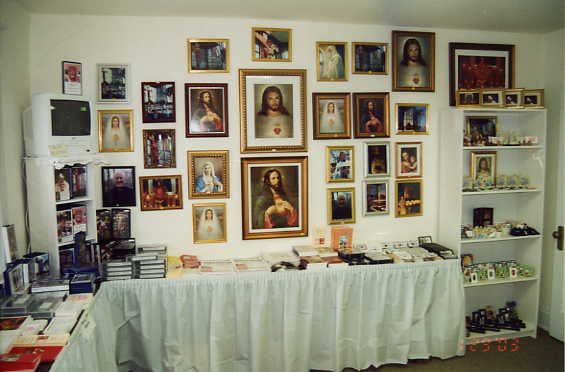
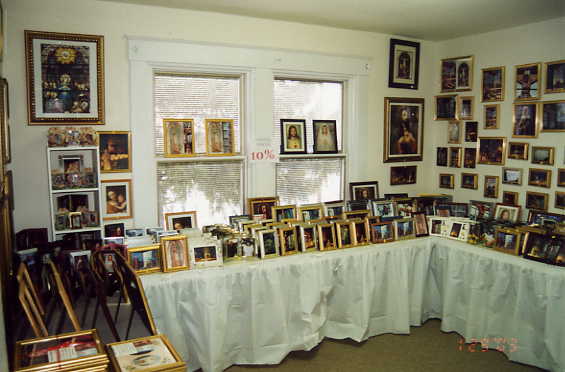
9859 Rt. 42
about 1 mile north of 275
open 10am to 5pm
The Shepherds of Christ
radio is awesome.
Go to the homepage and click.
You can listen while you are doing
many things and the
Blue Book readings and the
messages of Father Carter,
Newsletters and prayers,
will keep you very focused on God,
will help reveal to you some of
the tactics of satan,
and help you to be happy.
Listen as you see Mary on the building.
It is a real gift from God.
 Copyright © 2003
Shepherds of Christ.
Copyright © 2003
Shepherds of Christ.
Rights for non-commercial reproduction
granted:
May be copied in its entirety, but neither re-typed nor edited.
Translations are welcome but they must be reviewed for moral and
theological accuracy by a source approved by Shepherds of Christ Ministries
before any distribution takes place. Please contact us for more information.
All scripture quotes are from
the New Jerusalem Bible, July 1990, published by Doubleday.
Revised: February 10, 2003
URL: http://www.sofc.org
Contact Information for Shepherds of Christ
Email: info@SofC.org
Shepherds of Christ Ministries
P.O. Box 193
Morrow, Ohio 45152-0193
Telephone: (toll free) 1-888-211-3041 or (513) 932-4451
FAX: (513) 932-6791